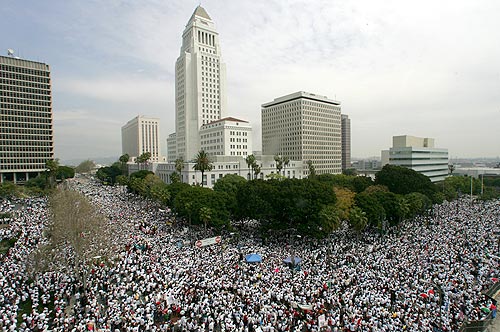|
Soc 450:
Globalization
and Social Change
Spring 2011 Instructor: Dr. Gonzalo Santos  
Upon
completion of Theme III course goals and objectives, CSUB students will
be able to:
|
|
Soc 450:
Globalization
and Social Change
Spring 2011 Instructor: Dr. Gonzalo Santos  
Upon
completion of Theme III course goals and objectives, CSUB students will
be able to:
|
Textbooks:
This course explores the theory and dynamics of
global integration in the contemporary social world, how it affects,
and in
turn is
affected by, the world's
economic, political, cultural and social structures, trends, and
processes. First, using the Roberts & Hite anthology of
articles, we'll analyze some of the key theoretical perspectives on the
origins, many structural dimensions, consequences, and contemporary
trends and challenges of globalization, from some of the classic
and
principal contemporary scholars in the field. Then, using the Jones
& Mielants anthology,
which analyze the past, present, and future of mass migrations in the
modern world-system. All in all, we'll read and
discuss thirty-eight articles.
Course Structure:
Attendance: Attendance
is mandatory (no
tardiness or early departures please, as these will be penalized, as
well as unexcused
absences, by taking one point off the final grade).
Furthermore, all
students must come prepared to discuss the assigned readings - either when they
make their
formal presentations,
or if they are not presenting,
by bringing to class their "reading
assessments" (see below).
These reading assessments must be turned in to Dr. Santos at the
beginning
of each class session.
Class Presentations:
The course will be run as a "semi-seminar," whereby in every class
session
an individual student (or two) will introduce the article(s) assigned,
followed by Dr. Santos's lecture and class discussion. Each student
presents once in the quarter. Students will be
assigned the date for their respective class presentation on the first
day of
classes. Any article assigned to a dropped student will be covered by
Dr. Santos.
Students shall do their presentations in
Power Point. Time allotted per individual presentation
will
be up to 15 minutes. Presenting students will introduce, describe,
highlight, and
summarize
his/her
own assigned reading, and on the last slide raise one or two key
questions
for class discussion. As a precaution, please bring your
presentations in a USB-type
memory stick and also email
it to your own email account or bring it in your laptop. Presenting
students should
show up early to set up & test their presentations prior to the
class starting.
The presentations will be graded based on: (a) the analytical strength and relevance of the presentation, including its depth on the selected key issues and the breath of the overall summary (how well it covers all the main aspects), (b) the quality of the question(s) posed at the end, and (c) the quality of the visual presentation and the poise, clarity, and effectiveness of the oral presentation.
Reading Assessments: To
ensure that everybody come to every class prepared to discuss the
assigned
readings
for the day, students who are not
presenting must bring to class written "reading assessments" - one
for each of the
assigned readings on any given day; each reading assessment should be a
page to two pages in length,
double-spaced, font 12. No
late reading assessments will be accepted (nor assessments
submitted by email), unless the students
has a pre-authorized absence from Dr. Santos.
HOW TO WRITE YOUR READING ASSESSMENTS: In contrast to the
presentations, these "reading
assessments" must not
summarize or describe
the
readings,
but must critically respond
to them:
express what the you think about them; identify the
areas
of strong agreement and disagreement
with
the author, explaining why
you do,
as well as the areas or topics of most
interest
to discuss, or
anything in particular that caused you amazement, confusion, or
surprise.
Whatever you write, you should explain
your
specific
analytical (and if relevant, personal) reasons for doing so. The
reading
assessment need not
cover
every issue found in the
assigned readings for the day, but it should
demonstrate
you read everything and chose well
what to comment on (early topics are
always suspect!). A very bad assessment will
reveal the student read
very little or very
superficially just to do the assignment (it's called "going through the
motion"). A good
assessment
will demonstrate the student really read all the material and did a
serious
effort to select and critically grapple with the main issues involved.
Please
always write on top of your reading assessments your name, the date,
and the
reading you are assessing.. At the end
of each reading
assessment, you should always write your own question(s) for class
discussion - Dr. Santos may randomly select a couple of
assessments to be read and/or questions to discuss.
Note: Students
presenting on a given day do
not need to submit a reading assessment on the text he/she is
assessing, but has to submit a reading assessment on any text assigned
to be presented that day by another student.
Research Papers: Each student will write a mid-term research paper and a final research paper on pre-approved topics related to the class. The papers need to be submitted in electronic form (in Word) in the course's Blackboard account. The first paper is due on May 6 by class time and the second paper is due on Wednesday, June 8, before noon, at Dr. Santos' office.
All paper topics must be previously discussed with and pre-approved by Dr. Santos.
Each paper should be bound and include a title page and an abstract, be between 6 and 8 pages long (excluding the bibliography). For a precise guide on the paper's format and citation style, go to:
http://www.csubak.edu/~gsantos/guide-paper.htmlEach individual paper should pose a central argument, or thesis, or hypothesis, and include the following sections: an introduction, stating the thesis/topic, as well as the theoretical approach and methodological framework of the paper; an analytical section on the relevant historical & contemporary processes, facts, data, related to the topic; this section should not only be descriptive, but it should include your critical analysis to explain these things, as well as other plausible alternative explanations in the literature, and your critique of them; your summary and main conclusions; a bibliography; appendices (if any). The bibliography ought to reflect a good search on the World Wide Web, as well as consulted books and scholarly journals in the library. Appendices should include charts, graphs, and figures covering the pertinent topic - the better selected, relevant, and more global in nature, the more valuable.
Plagiarism: To
prevent students from wittingly or unwittingly engaging in plagiarism,
Dr. Santos strongly recommends students to carefully read and abide by
the document CSUB Classifications of Plagiarism found at:
http://www.csub.edu/tlc/options/resources/turn_it_in_help_page.shtml
Anyone found guilty of engaging in plagiarism will automatically fail
the course and be reported to the Office of Student Discipline and
Judicial Affairs for further disciplinary action.
Grading:
Each research paper is worth 30 points. The class presentation is
worth 10 points. The reading
assessments are worth the other 30 points.
Every absence is penalized by the zero grade you'll get
for either failing to present on your designated date or for missing a
reading assessment. The
final letter grade will be
assigned, on a scale of 0
to
100, as follows:
Schedule
of
Reading
Assignment
| Week |
Monday |
Wednesday |
Friday |
|
1
March 28, 30April 1 |
INTRODUCTION |
Dr.
Santos
Roberts
& Bellone HiteArticle 1 |
Dr.
Santos
Roberts
& Bellone HiteArticle 2 |
|
2
April4, 6, 8 |
Student 1: ________________
Roberts
& Bellone HiteArticle 3 |
Student
2: ________________
Roberts
& Bellone HiteArticle 4 |
Student
3: ________________
Roberts
& Bellone HiteArticle 5 |
|
3
April11, 13, 15 |
Student
4: ________________
Roberts
& Bellone HiteArticle 6 |
Student
5: ________________
Roberts
& Bellone HiteArticle 7 |
Student
6: ________________
Roberts
& Bellone HiteStudent 7: ________________ Articles 8 & 9 |
|
4
April18, 20, 22 |
Student 8: ________________
Roberts
& Bellone HiteStudent 9: ________________ Articles 10 & 11 |
Student 10: ________________
Roberts
& Bellone HiteStudent 11: ________________ Articles 12 & 13 |
Student 12: ________________
Roberts
& Bellone HiteStudent 13: ________________ Articles 14 & 15 |
|
5
April25, 27, 29 |
Student
14: ________________
Roberts
& Bellone HiteStudent 15: ________________ Articles 17 & 18 |
Student
16: ________________
Roberts
& Bellone HiteStudent 17: ________________ Articles 19 & 20 |
Student
18: ________________
Roberts
& Bellone HiteStudent 19: ________________ Articles 21 & 22 |
|
6
May2, 4, 6 |
Student 20: ________________
Roberts
& Bellone HiteStudent 21: ________________ Articles 23 & 24 |
Student 22: ________________
Roberts
& Bellone HiteStudent 23: ________________ Articles 25 & 27 |
Student 36: ________________
|
|
7
May9, 11, 13 |
First
research paper due
Jones & MielantsStudent 24: ________________ Article 1 |
Student 25: ________________
Jones & MielantsArticle 2 |
Student 26: ________________
Jones & MielantsArticle 3 |
|
8
May16, 18, 20 |
Student 27: ________________
Jones & MielantsArticle 4 |
Student 28: ________________
Jones & MielantsArticle 5 |
Student 29: ________________
Jones & MielantsArticle 6 |
|
9
May23, 25, 27 |
Student 30: ________________
Jones & MielantsArticle 7 |
Student 31: ________________
Jones & MielantsArticles 8 |
Student 32: ________________
Jones & MielantsArticle 9 |
|
10
May 30June 1, 3 |
HOLIDAY Memorial Day |
Student 33: ________________
Jones & MielantsArticle 10 |
Student 34: ________________
Jones & MielantsArticle 11 |
|
11
June 6 |
Student 35: ________________
Jones & MielantsArticle 12 |
Second Research Papers due in Dr. Santos's office before noon on Wednesday, June 8 |
|
Date: My presentation will be on:
_________________________________________________________________
My second research paper title:
_____________________________________________